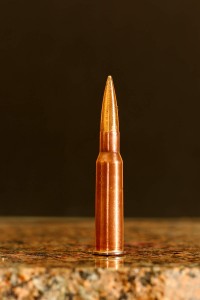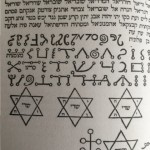Over the weekend I was involved in a discussion about whether a bullet is an appropriate offering for the Morrigan. It turns out that at least one prominent Morrigan devotee is advocating this practice. If you’ve been reading this blog for awhile, then you can probably anticipate my thoughts on the matter.
I don’t think it’s a fantastic idea.
It’s not that I believe you shouldn’t be allowed to do it, or that I fancy myself the final authority on what the Morrigan wants. Gods are bigger than our personal preferences and world views. They’re bigger than our conceptions of them. I frequently go back to the way my Reclaiming teacher

describes our relationship with gods: like blindfolded people feeling an elephant. If I feel the flank and you feel the trunk, then we’ll come away with very different ideas of what the beast is, but we’ve both felt the same beast. That’s why all the arguments I see about what the Morrigan is or isn’t are such a colossal waste of time. “The Morrigan’s the flank!” “No, she’s the trunk!” Actually, she’s both and more. (Besides, why would anyone venerate a god who was nothing but trunk? That god strikes me as rather flimsy.)
So, is a martial tool an acceptable offering to the Morrigan? Sure. So is an olive branch. Or a pen. Or a tarot card. Or a vagina pop or a bone or a cup of whiskey or a seedling or a photo of Rosa Parks. (This fervent drive I see to reduce the Morrigan to a war goddess and nothing else isn’t just deeply troubling, it’s factually incorrect.) A god is one of the beating hearts of the world, not a bland little morsel for our consumption, and truly honoring that god means honoring them in their totality. If, for example, we want to believe that the Morrigan’s energy is active on our side of a fight, then we’d better be prepared to accept that her energy is active on the other side, too; otherwise we start to resemble football teams each believing that Jesus is helping them win. (My friend Ravenna put it best when a group we were in went through a meltdown that ultimately proved transformative: “This is the Morrigan’s party, and she’s DJing!”)
So why, then, my less-than-thrilled reaction at the bullet? Because what we choose to offer to a god–and our reason for choosing it–says much more about us than it does about the god. And yes, we always have a choice; we’re not slaves. I’m mainly talking to Americans here: given our historical moment, if you think a bullet is a fine, healthy offering to a goddess of sovereignty–especially in the midst of our mass shooting epidemic and racist, militarized police; especially in light of the fact that violence has never been cured by more violence–then what does that say about you? What does that say about the qualities you want to nourish and feed within yourself? If a bullet is okay, why not a landmine? Or napalm? Or a nuclear warhead? If you’re making such an offering because you perceive that the Morrigan’s telling you to, is it because the message is genuine and complete, or because you’ve conditioned yourself to block other messages out? (That’s not a shameful thing; it’s a human thing, and it happens to all of us.) I’m going to ask a tough question here, one that will probably raise some hackles: is it really the Morrigan you love, in all her complexity and uncomfortable truths, or is it the thrill and video-game fantasy of violence?
An offering is, in a way, a fetish object. What objects do you consider holy enough to fetishize? Why?
As I write this, I’m thinking about my athame, which I often place on my altar when working with or venerating the Morrigan. It’s sharp; theoretically I could kill someone with it. What makes it more than just an instrument of violence, though, is that the blade has power on a metaphorical level as well as a physical one. Kali’s scimitar destroys the pernicious force of the ego; similarly, the Sikh kirpan, in addition to standing for justice and mercy, symbolizes the enlightened mind that slices through doubt and attachment. The sword, in the tarot, cuts away lies and deception to reveal knowledge and justice. T. Thorn Coyle writes in Evolutionary Witchcraft that the athame “is a warm blade, full of sex and desire and the life force that runs through all things. The stronger this blade becomes, full of the confidence of pride, the more it brings with it the power of law” (105). The blade can bring death, yes, but it can also spark life–cutting bonds, creating sacred space, setting one free from the prison of attachment.
The gun, though? In this epoch, in this dysfunctional country, what does a gun do besides kill?
So, look–if you want to sanctify a bullet by laying it on an altar, I’m not going to stop you. But don’t delude yourself into thinking that you’re doing it in a vacuum, or that you hold no accountability for the culture you’re feeding. Gods change people, yes, but people also change gods, and the Morrigan, like Kali and other martial goddesses before her, is evolving right alongside us.
What kinds of offerings will give our descendants a world worth living in?
















